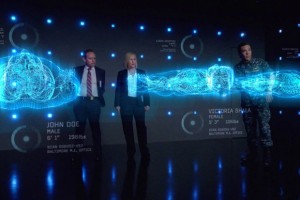2015 has seen a proliferation of new TV shows about hackers, hacking, and cyber security. But how well do they hold up to reality? Which ones raise awareness of cyber security and which are way off in he clouds? And how do you make an activity that’s about as dull as watching a grade school student doing homework into riveting TV?
These four shows that debuted in 2015 each have their own unique approach, and some work better than others. I mean waaay better. Arranged from most outlandish to best depiction, here they are.
1. CSI: Cyber (CBS)
Dark net! Deep web! Leetspeak! Cyber arson! This show should strain credibility even if you don’t know a smartphone from a thermostat. This new CSI spinoff exists on the premise that whatever you don’t know that’s powered by electricity can kill you, and it does it with a visual flourish that rings false.

Arquette’s Avery Ryan is a former psychologist whose patient database was hacked, leading to the murder of one of her patients and the end of her practice. Which is a compelling enough backstory that shows the real-life consequences of security breaches. And then the show goes and has people killing each other remotely through technology, hijacking a roller coaster electronically or causing printers to catch on fire remotely.The show features an FBI agent played by Patricia Arquette left in charge of a team of hackers who investigate crimes on the Internet together. But rather than combating cyberwarfare attacks and busting torrent sites for copyright infringement, they’re out there solving murders, bombings, and plane hijackings.
You know what, there are some pretty crazy things hackers can do with technology, but if you want to kill someone, the most effective way is still taking a gun and shooting them. The cyberattacks that are making huge headlines aren’t typically about Rube Goldbergian murders through technology, but more about fairly basic theft with major real-world consequences.
The show fails reality in the outlandish lengths it goes to put technology in the defendant’s seat, and it feels like it was written by someone who’s just opened their first e-mail account. The more you watch of this show, the less accurate your understanding of technology will be.
Quite ridiculous, but makes for good hatewatching material for computer security experts. It’s good to have security concerns online, but no need to act like there’s a gun pointed at your head. The Internet is a fun place, so why are we here if it’s one big disaster?
2. Sense8 (Netflix)
Sense8 is a high-concept TV series from the Wachowskis (the siblings who brought us the philosophical cyberpunk masterpiece The Matrix) and J Michael Straczynski of Babylon 5 fame. It spotlights eight individuals around the world who share a psychic connection allowing them to communicate and even share unique skills (such as combat, acting, driving, medicine). One of the eight is played by Jamie Clayton, whose back story incidentally includes a past as a hacker, convicted of a hacking crime under the age of 18 to take the fall for an older friend.
When Clayton’s character Nomi decides to put her hacking skills to use to move the show’s plot forward, she calls up that old friend for some equipment. Next, there’s a van full of hacker hardware, and the two characters have a very colorful conversation about said equipment.
- Bug: Okay, let’s start you off with some switch-hooks
- Nomi: I need a candy gram and a feed trough that can burrow through any firewall ever built.
- Bug: Things are getting exciting…
- Nomi: Annnd, how about a water witch?
- Bug: No, but I do have…
- Nomi (in awe): A rage master? That’s NSA grade!
Once these tools are obtained and set up, however, they grant Nomi near wizard-like powers, able to hack into any computer system anywhere on the planet with little notice or preparation time.

Yes, a good hacker could get into a building’s security camera feed to monitor or manipulate footage, or disable alarms, or whatever. But this takes a huge amount of preparation and likely prior visits to the target location. Hackers in TV or movies are often portrayed as omniscient and near-omnipotent, able to give real-time intelligence to a field agent to bypass security, analyze blueprints, and get personal information about anybody. It’s a writer’s shortcut that seems lazier the more it’s abused.
3. Deutschland 83 (Sundance)
The only non-American show of the bunch, Deutschland 83 is a miniseries starring Jonas Nay as an East German sent to West Germany as an undercover spy in 1983, right when the two Cold War superpowers were squaring off for a possible nuclear war, poor divided Germany stuck in the middle.
If you’ve seen it, you may not have even noticed any hacking at all. Nay’s character Moritz Stamm, AKA Martin Rauch to his East German family and friends, breaks into a hotel room safe to steal a floppy disc containing a secret NATO report.
He gets it back into the hands of his communist minders, but their troubles are far from over. The disc is incompatible with East German computers, and the spies work tirelessly on decrypting the data. As of the last episode that’s aired, I believe they’ve decided they need to smuggle a computer past an embargo into East Germany to view the thing, and even then, there could still be further complications (hey, I’m trying to keep this spoiler-free!).

The one great thing about this subplot that especially rings true in today’s Information Age, is the use of hacking and stealing data by rival nations. Just as East German agents pulled off this job, today we have a number of hostile and rival nations to contend with–only today’s cyber threats may come from government-sponsored hackers in Iran or North Korea, and reportedly even China or Russia. Fortunately there’s no East Germany to worry about anymore.The whole process is fraught with uncertainty and way too much impatient waiting, as East Germany’s computer engineers muse about how to read a simple floppy disc. In other words, it’s one facet of the whole espionage plot that comes across well.
4. Mr. Robot (USA)
Ever since its pilot was uploaded to YouTube in May, critics have been praising the hacker thriller Mr. Robot for the depth of its acting, its beautiful cinematography, and its attention to detail in portraying hacking and hackers. Even a member of secretive hackers network Anonymous has praised the show’s realism.
The show stars Rami Malek who plays Elliot, an antisocial drug addict who works for a cybersecurity firm by day, and acts as a vigilante hacker at night. His social anxiety prevents him from connecting with regular people, so instead he uses numerous techniques to hack their information and spy on them. His character is psychologically realistic, even if he can be an unreliable narrator prone to hallucinations.

“If our tech expert is saying it cannot be done or it cannot be done easily, then we don’t do it,” explains Sam Esmail, show creator. “We only adhere to hacks that have happened that we’ve researched.” We see various hacker characters making phishing phone calls to get personal information to help solve passwords, distributing malware-infected CDs in front of an office building to gain access to computers inside, and installing spyware on a phone. The cell phone hacking scene was so realistic, one viewer was able to identify the software and confirm that yes, we may have seen a real phone being hacked in the show. The targets of these attacks include large corporations and powerful executives, but also cafe owners (though he had it coming, worst of all), hospitals, and just anybody on the street.
“My biggest complaint on a lot of those [movies and TV shows] is the time element — that they can hack anyone’s password in 10 seconds,” said technical consultant Michael Bazzell. “This show has a respect that these things can take time, and the biggest thing I believe is that this show has respect that things don’t always work out.”
Mr. Robot excels in its realism in that not every hack works, and it isn’t afraid to depict the time-consuming preparations needed for hacking operations, two all-too common frustrations in any sort of IT work.
Beyond the hardware, much of the hacking done on the show focuses on the human element, rather than a wave of the mouse and instantaneous access.
In one scene, Elliot is discussing with other hackers how to infiltrate a high-security data facility so they can destroy its data.
- “All we need is one security flaw,” says Elliott.
- “Look at this place, man,” protests one of the other hackers. “It was built not to have any.”
- “I see about six walking around,” Elliot muses, studying the pictures of six workers on site.
Mr. Robot’s focus on social engineering techniques is impressive, highlighting the fact that many of a hacker’s expoits of a system can be human-based rather than technology-based. We see powerful security institutions compromised because their users are manipulated, blackmailed, or corrupted into complying.
Because it understands the psychology of a hacker, and portrays the hacker’s toolkit reasonably accurately, Mr. Robot has earned high praise from TV critics and security experts alike. And on top of that it’s engaging, dramatic television that anyone can enjoy, and it’s already been renewed for a second season, announced even before the pilot officially aired.
Aside from the obvious movie examples, did we forget any other shows this year that feature or include hackers? Check out Wired’s take on the subject in the video below!






